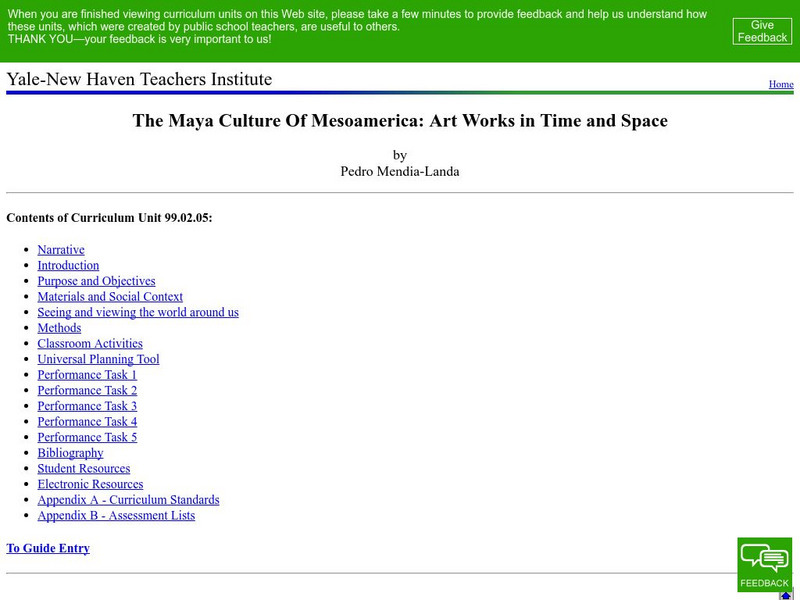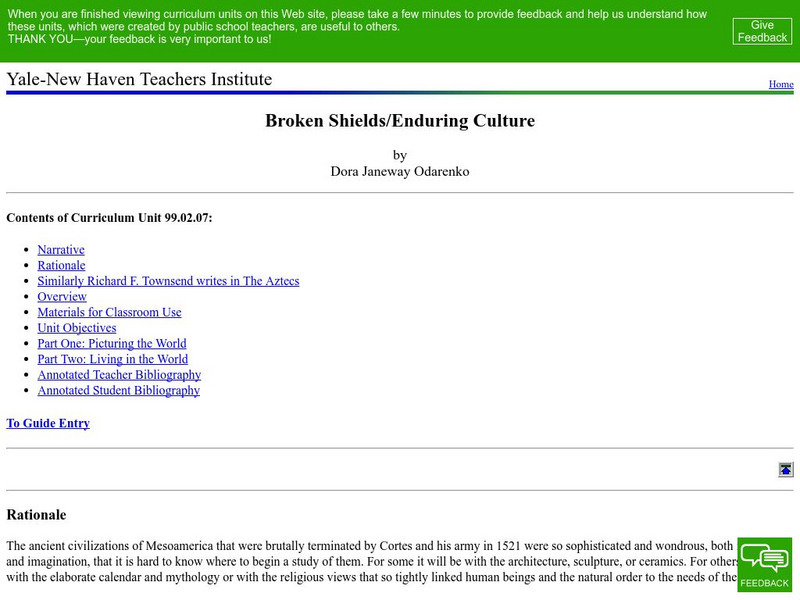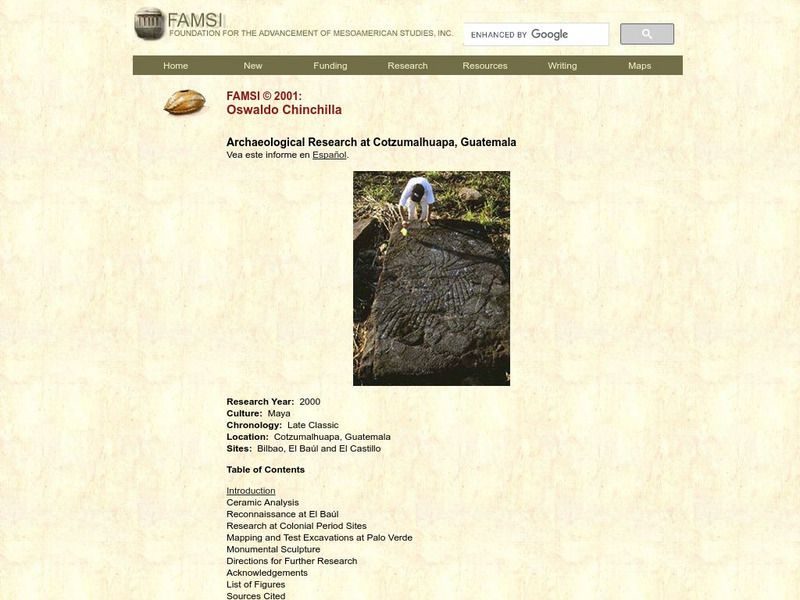Hi, what do you want to do?
Core Knowledge Foundation
Unit 2: Early American Civilizations
Fifth graders explore early American civilizations in a four-week ELA unit. Every lesson offers an opportunity to read and discuss a selected passage followed by word work that covers vocabulary, grammar, and morphology. Learners write...
Core Knowledge Foundation
Maya, Aztec, and Inca Civilizations
A 10-lesson unit explores the Maya, Aztec, and Inca civilizations. Over the course of two weeks, scholars read nonfiction excerpts, discuss their findings, and complete activities. An assessment equipped with multiple choice and matching...
Core Knowledge Foundation
Maya, Aztec, and Inca Civilizations
Here are a series of lessons on the Mayan, Aztec, and Incan civilizations. This incredible, 15-lesson unit would be perfect for any fifth grade study on these important civilizations. Learners focus on the complex nature of the cultures,...
Core Knowledge Foundation
Early American Civilizations Tell It Again!™ Read-Aloud Anthology
Bridge subjects ancient history and English language arts together with a unit all about the Maya, Aztec, and Inca civilizations. Eleven lessons begin with a read-aloud followed by a whole-class discussion in preparation for practice by...
Smithsonian Institution
Ceramica de los Ancestros
Scholars join a field expedition team to unearth a plethora of treasures from Central America. Artifacts listed in alphabetical order come with an informational blurb and a picture designed for participants to color. Activity pages...
Virginia Department of Education
World History and Geography to 1500 A.D.
Here's a great resource for your curriculum library. The 240-page packet, organized into units by topics, includes sample lesson plans, links to primary and secondary source documents, worksheets, activities, and sample assessments.
Partnership for Educating Colorado Students
Mayan Mathematics and Architecture
Take young scholars on a trip through history with this unit on the mathematics and architecture of the Mayan civilization. Starting with a introduction to their base twenty number system and the symbols they used, this eight-lesson unit...
Curated OER
Hanal Pixan
Students research the culture of Mexico. In this Mexican culture lesson, students view a PowerPoint presentation about the culture of Mexico and the students take notes. Students write an essay about what they have learned.
Curated OER
Aztec and Mayan Mythology
Here's a fresh take on a mythology unit. Use the myths of the Mayan and Aztec peoples of Mesoamerica instead of the more traditional Greek and Roman stories. This abstract suggests possible approaches and resources that can be...
Curated OER
Come On Over To Maya Place
Fifth graders analyze the Mayan culture. In this Mayan culture lesson, 5th graders study the Mayan culture noting similarities and differences between the Mayan culture and their own. Students examine hieroglyphic writing and the Mayan...
Curated OER
A Classical Maya News Report
High schoolers research the culture of the Mayans. In this early civilizations lesson, students research selected Maya city-states including Tikal, Clakmul, Piedras Niegras, and Uaxactun. High schoolers use their research...
Curated OER
Understanding Mayan Culture
Students study an ancient culture in Mexico whose people were called the Mayans. They compare certain aspects of Mayan culture with Ancient Egypt. They discuss why some other ancient cultures (Egypt and China) were able to survive for...
Curated OER
American Civilization
First graders become familiar with Mayan culture, Aztec civilization and the Inca Empire.
Curated OER
Mayan Culture
Learners examine the attributes of the Mayan culture. In this Mayan culture instructional activity, students identify the structure of social classes in Mayan society and design posters that feature their findings.
Curated OER
Mayan Culture
Students use RAFT prompts to write about Mayan society. In this activity on Mayan culture, students research and then explain the Mayan hierarchy and social structure. As a culminating activity each student will write a newspaper article...
Curated OER
Cracking the Maya Code
Learners analyze the meaning of Maya glyphs. In this Mayan communication instructional activity, students use Mayan symbols to calculate their birthdates according to Maya Long Count.
Curated OER
Me Oh Maya
Students compare basketball to Mayan ring-ball. They write a newspaper article that may have been published during Mayan times.
Science Museum of Minnesota
Science Museum of Mn: The Puuc Hills: Uxmal
Numerous photographs of the ancient Mayan city of Uxmal.
Science Museum of Minnesota
The Temples of Tikal
This site provides various pictures of the numerous temples in the Mayan city of Tikal.
Yale University
Yale New Haven Teachers Institute: Art Works in Time
This site is a curriculum unit on the Maya culture for elementary students. Provides a lot of background information, five lesson plans, a bibliography, and other resources.
Yale University
Yale New Haven Teachers Institute: Enduring Culture Lesson Plans
This unit on Mesoamerican and Mayan culture contains lesson plans, a list of materials, objectives, bibliographies, and much more. The lessons could also be adapted to various grades.
Yale University
Yale New Haven Teachers Institute: Popol Vuh
This unit is geared towards grades 4-8, but could be used with ESL high school students. Contains lesson plans integrating language arts and social studies, with a bibliography, a play, recipe, and a reading list for students.
Foundation for the Advancement of Mesoamerican Studies
Famsi: Archaeological Research at Cotzumalhuapa, Guatemala
Research at Cotzumalhuapa indicates that it was a major urban center that encompassed Bilbao El Baul, and El Castillo. Some discussion of colonial period use of site.
Foundation for the Advancement of Mesoamerican Studies
Famsi: Salvage of Hieroglyphic Stairway in Dos Pilas (2002)
Comprehensive discussion of what the discovery of stairway steps adds to history of the site and the culture. Writings on steps give new insights to Myan politics, trade, war, and the collapse of the civilization.



























